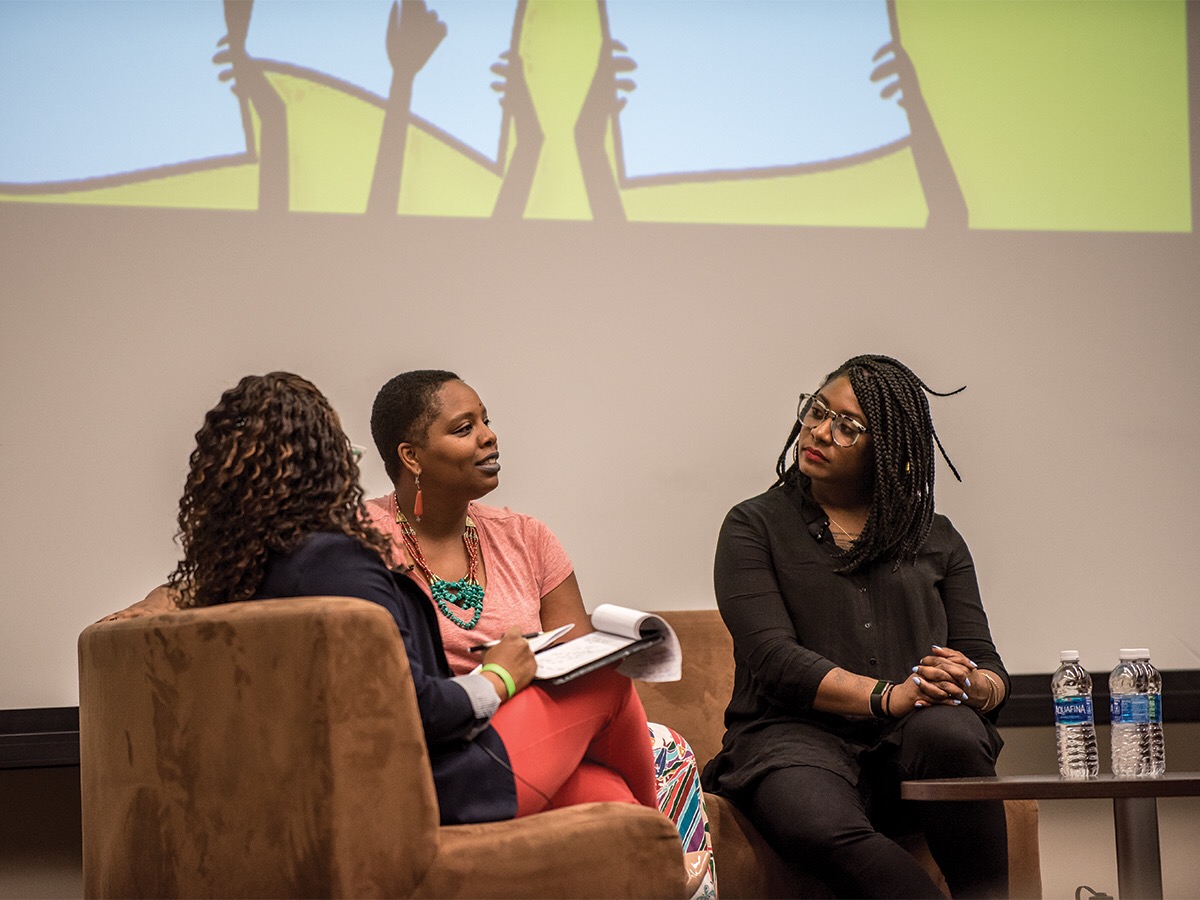
The easy way to begin the origin story for the Black Lives Matter movement is to start in July of 2013 when George Zimmerman — the neighborhood watch volunteer who fatally shot down an unarmed 17-year-old Trayvon Martin in Sanford, Florida — was acquitted of murder.
That day, Alicia Garza, one of the three co-founders of BLM, posted her response to the verdict on Facebook: “the sad part is, there’s a section of America who is cheering and celebrating right now. and that makes me sick to my stomach. we GOTTA get it together y’all.”
And not long after, another post from Garza, in which the closing words read, “black people. I love you. I love us. Our lives matter.”
From there, Patrisse Cullors, a friend of Garza’s since the two met at an organizers’ conference in Providence, Rhode Island in 2005, altered the final three words of Garza’s post to form the unapologetically blunt and now-emblematic hashtag #BlackLivesMatter. Quite rapidly, the words became less of a momentary hashtag and more a call to action, then not solely a call to action but more broadly a crusade. And now, co-founders Garza, Cullors and writer and immigration-rights organizer Opal Tometi firmly remain at the forefront of what effectively stands as the premier social justice movement of the contemporary era — the absolute trailblazer for modern day Black activism.
Though again, that’s the easy way to tell it.
In truth, Black Lives Matter (BLM), as the women attest, is not merely a hashtag-turned-movement established by three community organizers in 2013 but a direct manifestation of centuries of systematic black oppression in America and long-standing racism both domestically and abroad. It is an extensive and complex history which I will absolve from this here platform (also, really, if you aren’t aware by now … ) and one for which a singular root is likely untraceable.
However, if Garza were to pinpoint a foundation, she may begin with “Mama Harriet” — a.k.a. American abolitionist Harriet Tubman who, in 1849, escaped slavery and rescued upward of 70 enslaved family and friends using the Underground Railroad. While on stage Wednesday evening, Garza acknowledged she prays to Tubman often, finding inspiration through her unequivocal persistence.
“This is a woman who, when she first went through the Underground Railroad, lost her two brothers, and then they got free and they decided they were going to go back (into slavery),” attested Garza. “This is a woman who went back for her sister and her sister had died once she got there, but she kept going. This is a woman who went back to get her husband, who had since remarried and decided he wasn’t trying to go nowhere. She kept going.”
Mama Harriet is somebody who, in short, worked insatiably to break through literal chains and help her loved ones achieve the same. And, as the BLM movement’s epoch moves further along, it is Tubman who serves as an archetype for their still-to-be-written narrative.
As it has long stood, these chains (injustice, inequality and anti-black racism) remain ceaseless and, while on stage Wednesday for the Women’s Resource Center and ASPB’s “Beyond the Hashtag: #BlackLivesMatter” event, Cullors and Garza acknowledged a room full of students and staff looking to join them in efforts to break free. To where it leads will be told with time.
Following their discussion and an impromptu picture and autograph session with more than a few of the event’s attendees, Cullors and Garza sat down with me for a very brief interview backstage, which you’ll find below. In it, they discuss the growth of the movement, operating under the current political climate, how cross-sectionality affects their direction and how exactly those chains get unbroken.
The questions and responses below have been unedited.
Myles: First, I appreciate y’all taking the time to speak with me. One thing I wanted to get to is that you started this movement over three years ago and, if one were to only pay attention to the headlines or what’s portrayed by media on the surface, it would be difficult to accurately gauge the development of the relationship between the black community and law enforcement. You’ve been on the ground and actively immersed within the movement; how would you describe the growth you’ve seen over time?
Patrisse: Over the last three years or in general?
Let’s say the last three years.
Patrisse: I think that in the last three years the movement has evolved in different ways. On the one hand, with the killing of Trayvon Martin, I don’t know if folks remember but there was very, very little media coverage during his murder. In fact, his family, his parents were the ones that were on the frontline being like “This is out of control. Not only did you not arrest the killer of my son, nobody’s having this conversation.” And so it was really through their leadership that they built a movement around how to have the conversation about Trayvon and it’s why many of us started to follow the situation over social media, we followed the trial of George Zimmerman and then the acquittal of George Zimmerman. It was a spontaneous response, right? We were literally grieving on social media and processing and talking. It wasn’t until Alicia wrote “Black Lives Matter” and we put a hashtag on it and then we built a project around it. We’re organizers. So we didn’t come in saying we’re going to organize a political project but, once we saw how it resonated with people online, we were like, “Oh, actually we could build something out from this. This is something that can live both online and offline.” And so what you see in that first year, if you look back at protest pictures, of people holding the hashtag #BlackLivesMatter from Los Angeles to Oakland to Delaware to New York, people are using it as a way to have another conversation and to talk about us as Black people and then a lot happens in that year. If you remember Marissa Alexander, the Black woman who was a mother who was fighting off her abuser and fired two warning shots in the air, right? Didn’t kill anybody but was on trial for 60 years, she was fighting a 60-year trial. So we were following that. Renisha McBride was killed that year.
Alicia: That’s right. Jordan Davis was killed that year.
Patrisse: Jordan Davis. And so what we start to see is we have to expand the conversation. Very early on we were expanding the conversation around whose Black life actually matters. So the narrative around it’s only cis-black boys who are the perfect victims, right? We were actually interrupting that narrative from the very beginning. That we need to be showing up for Renisha McBride, we need to be showing up for Cece McDonald. And then the movement evolves again and it’s when Mike Brown is killed and we realized there’s a lot of people around the world and the country that want to put their boots in the ground and fight back. And that for people, Mike Brown and the uprising in Ferguson resonated so deeply in Black communities because we understood that Ferguson was everywhere. The media was trying to tell us something different, like this backward ass town in Missouri killed this boy on the street “Oh my god that town, that don’t happen in California” and we had to be like, “Nah actually here are all the ways it does and actually this is a national and international crisis, state violence in Black communities.” And so we started the network and that was very intentional. We wanted to be able to hold space for people across the country and we wanted it to be nimble, we wanted it to be decentralized, we wanted it to be local-focused with sort of big ideas around what’s possible in a pushback. And now we’re in a new moment. With 45 (45th U.S. President Donald Trump) in office we’re, as a network, trying to figure out what’s next, how do we relate and we’re sort of in that.
I was queer before I knew there was a movement and I was Black before I knew there was a Black liberation movement and I’ve never felt so much of those things as I do right now.
Bouncing off what you mentioned about changing the narrative, not only are you people of color, but you’re women of color and, as you said on stage, two of the three of you identify with the queer community as well. I’m curious how that intersectionality has shaped your experience in trying to build this movement. Both in ways you’ve struggled and how it’s been advantageous. Question is open to either one of you.
Alicia: I mean, this is our life, you know what I’m saying? I was queer before I knew there was a movement and I was Black before I knew there was a Black liberation movement and I’ve never felt so much of those things as I do right now. I was just on my phone and I was reading two things: One, they tore it up at Cal (in protest of Breitbart senior editor outspoken Trump-supporter Milo Yiannopoulos) they said, “Nah not today. We don’t do that kind of thing in the Bay.”
Patrisse: (Laughs) I saw that. You saw that?
I did, I did.
Alicia: See what happens when you bring this hate speech to Berkeley, people don’t have it (laughs). But the other thing that I was reading was about the executive order that’s gonna come out later this week that is basically allowing for discrimination against queer people based on religious preferences. And this is what I was saying in terms of Donald Trump’s new deal for Black America. It literally says inside of there that he pledges to protect the church and that’s what this looks like. And so what that means for me very personally, beyond the rhetoric is I’m married to somebody who doesn’t fit inside gender binaries and we were in limbo for a really long time because people in our state decided they wanted to try to move that agenda in California. Supreme Court eventually struck it down but what that means for me very tangibly is if I walk out of here right now and I get in an accident, my next of kin is my partner. And if they can’t come and make decisions for me in the hospital when I can’t make them for myself that impacts our family. Our ability to start a family is impacted by this kind of stuff like where you can give doctors exemptions for being able to support queer families who want to start a family because of their own personal beliefs. And then of course, there is a war on Black America and when I sit anywhere I am, I am conscious of the fact that I can be and have been a survivor of racially charged violence. So it’s not a theoretical thing is what I’m trying to say. It’s the things that impact our daily lives are why I personally am a part of this and why I feel like it’s so necessary for us to have space where people can come together from various experiences and have each other’s back. And what’s at stake is very tangible things like our right to be in community, our right to love who we want to love, our right to sit in a room like this together, you know what I mean? Like people could literally change the rules and say “Actually, we don’t want you all in a room together. Y’all go over here, y’all go over here and y’all go over there.” And there’s already a way in which they’re trying to divide us, right? So the plan for Black America around jobs revolves around us being a wedge in terms of the immigration reform fight, which is not acceptable. Not only because there are Black immigrants but because the ways in which they’re trying to divide us from each other, like people that have a lot at stake, has the potential to take the humanity out of this country if that makes sense. So that’s what it is for me. That’s what I got.
100 years from now, looking back on Black Lives Matter, what’s the one word you would want people to reflect and describe it as?
Alicia: Power.
Patrisse: Yes.
Power. And same for you?
Patrisse: Mhm.
Read the rest of our Beyond the Hashtag: #BlackLivesMatter event coverage here and here.








